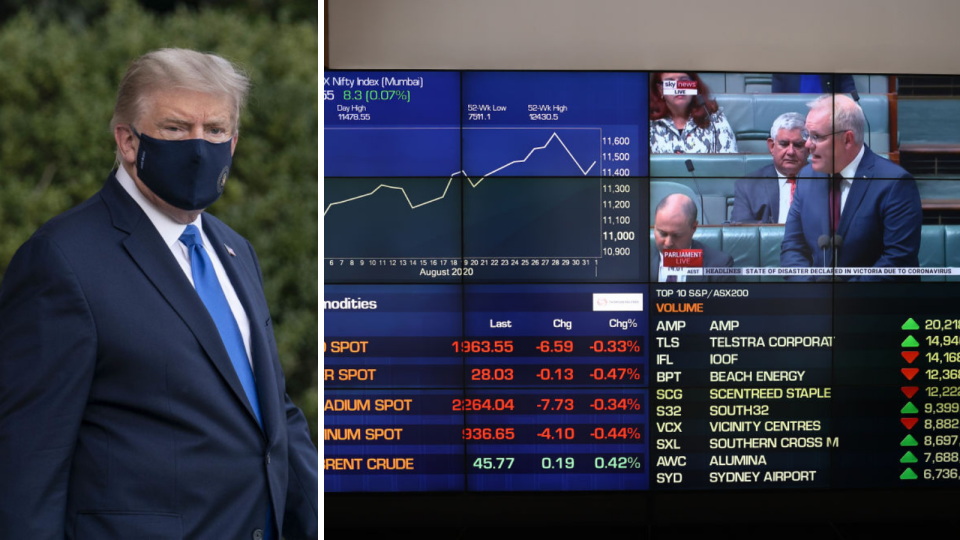‘Volatility’: What Trump’s Covid-19 diagnosis means for Aussie stocks

Both Australian and global share markets slid after news broke that US President Donald Trump and wife and First Lady Melania Trump had contracted Covid-19.
The benchmark ASX200 dropped by 1.39 per cent on Friday, with all three of America’s major stock indices also closing Friday in the red.
But what impact will this have on share markets in the longer term?
Also read: Why Tesla and Apple stocks could rise 33%
Also read: Top 5 stocks for your new financial year portfolio
Also read: ‘The holy grail’: This stock surged 2,800% in 10 years
‘Uncertainty’, ‘volatility’ – but it won’t last long
According to AMP Capital chief economist Shane Oliver, the news has “add[ed] to the short-term uncertainty”.
“The US constitution clearly sets out that if the President is incapacitated the Vice President takes over and next in line is the House Speaker and then the longest serving Republican Senator so the US will still be led,” he wrote in a note over the weekend.
“Trump’s infection may reinforce the seriousness of the pandemic and this could impact confidence and spending in the US which would be negative – but it may also lead to a more sensible US response to the virus which would be positive.”
But Schroders group chief investment officer Johanna Kyrklund dismissed the dip in stocks on Friday as short-lived.
“Markets have a tendency to overreact to daily news around elections, as can be seen ... following the news of President Trump’s Covid-19 diagnosis,” she said.
‘Do nothing’
While investors might be tempted to reconsider their investment portfolio, Kyrklund advised against rash decisions.
"For investors, this short-term volatility can cause nervousness, but the best response at times like these is often to just sit on your hands and do nothing. Political trends that have serious investment implications tend to play out over months and years, the rest is just noise,” she said.
"While the US election is clearly a major political event, in investment and economic terms it’s a sideshow in comparison to the pandemic.”
According to Schroders global strategist Sean Markowicz, the dip in stock markets can be interpreted as a sign that Biden’s chances of winning the US Presidential Election have increased.
“On average, stock prices have fallen by 2.7% in the final three months before an election whenever the incumbent political party lost, but have rallied by 6.5% if the incumbent party won,” he said.
“With US equities up only 3.3% so far, overall it seems that investors still feel uncertain about which political party is most likely to win (although the sharp downward move [on Friday] will have detracted from the figure).”
Would a Biden win be bad for stocks?
Not necessarily, said Markowicz.
“For example, our previous research found that the difference in long term US equity returns under Democratic versus Republican presidents was virtually zero. So party affiliation is not irrelevant, but its significance is often overstated,” he said.
"After all, presidents do not operate inside a vacuum and there are many other factors that can influence markets such as valuations, interest rates, inflation and oil prices, among other things.”
What if Trump died in office?
In the short term, it wouldn’t look pretty – but there would actually be an interesting effect in the medium-term after his death, according to Oliver.
“The historical experience since the 1880s shows that the US share market is up about 80 per cent of the time six months after a president has died in office.”
Make your money work with Yahoo Finance’s daily newsletter. Sign up here and stay on top of the latest money, economy, property and work news.
Follow Yahoo Finance Australia on Facebook, Twitter, Instagram and LinkedIn.

 Yahoo Finance
Yahoo Finance 
